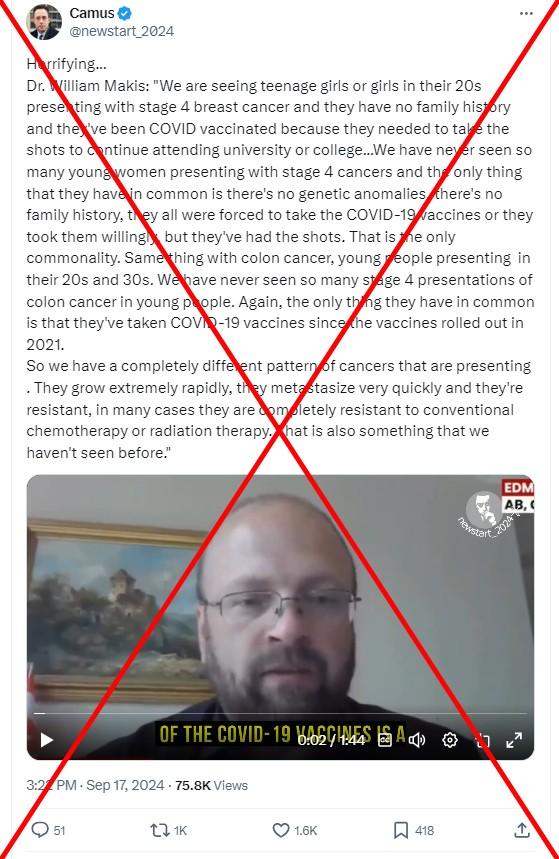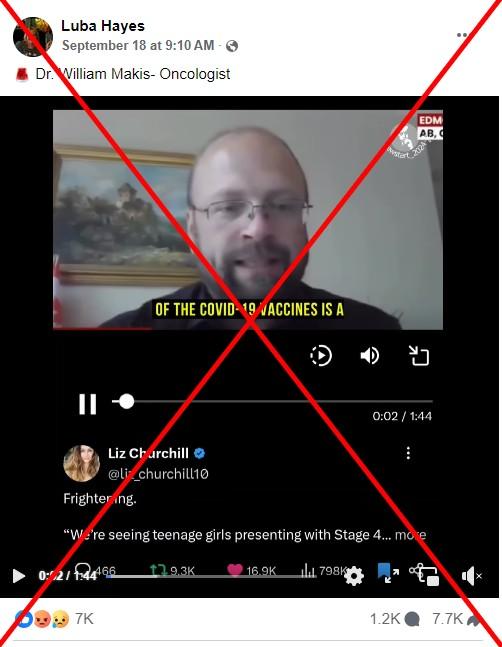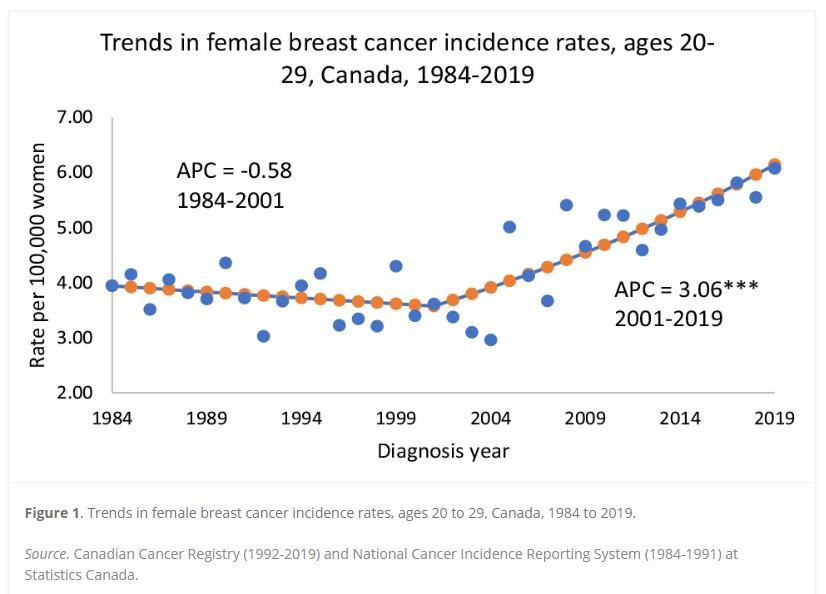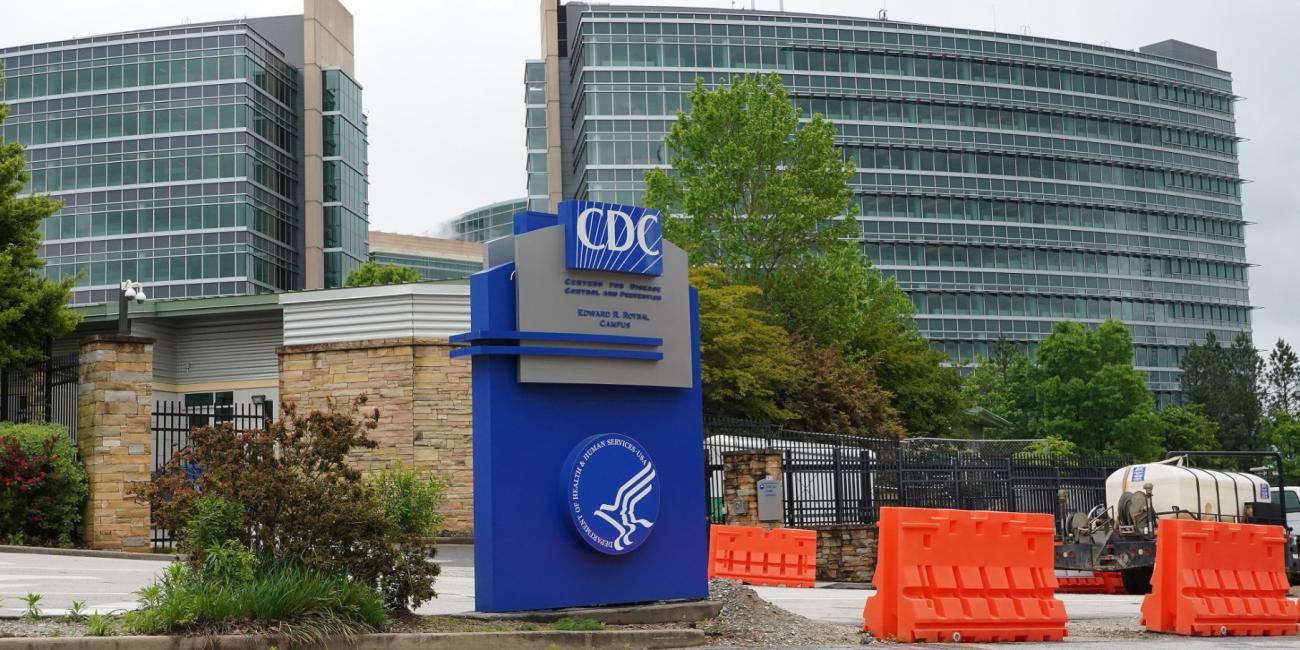
Claims that Covid vaccines cause early-onset breast cancer are unsubstantiated
- This article is more than one year old.
- Published on October 7, 2024 at 21:46
- 3 min read
- By Gwen Roley, AFP Canada
"We are seeing teenage girls or girls in their 20s presenting with stage four breast cancer," says William Makis, an Albertan physician whose medical license is inactive (archived here), in a video shared September 18, 2024 on Facebook.
Makis, whom AFP has previously fact-checked for spreading misinformation, goes on to claim the only commonality among the patients is that they received Covid-19 vaccines.
The clip has spread across X, Instagram and Facebook. A reverse image search reveals the footage comes from a June 2024 interview (archived here) with online radio station TNT.news -- a network that has previously hosted conspiracy theorists.


The publications are the latest in a crush of misleading claims about the shots, which researchers estimate have saved millions of lives (archived here). AFP has repeatedly debunked claims linking Covid-19 vaccines to cancer.
"There is no evidence that Covid-19 vaccines cause cancer, lead to recurrence, or lead to disease progression," the US National Cancer Institute says on its website (archived here).
Anna Wilkinson, a general practitioner-oncologist at the Ottawa Hospital Cancer Centre (archived here), said Makis's claims about the cause of breast cancer diagnoses in younger patients are also unsubstantiated.
"Absolutely, we have not seen this," she said September 27.
Long-standing trend
Wilkinson said doctors have seen "a prolonged increase in the incidence of breast cancer in younger women," stretching back as far as 1984.
An April 2024 study co-authored by Wilkinson and published in the Canadian Association of Radiologists Journal examined breast cancer incidence in Canada between 1984 and 2019 for people aged 20 to 54 (archived here).
The researchers found an increase in diagnosis rates across all age groups before the pandemic, with the steepest jump among 20 to 29-year-olds.

The best available data from Statistics Canada show no provinces had a large jump in cancer diagnoses among younger people during the Covid-19 vaccine rollout (archived here).
However, there was a slight increase in breast cancer cases among 25 to 39-year-olds between 2005 and 2021 (archived here). There was a similar trend among American women in their twenties between 2012 and 2021 (archived here).
Wilkinson did not blame Covid-19 vaccines, instead saying researchers are still looking into the cause of the increases.
"It's very difficult to kind of prove cause and effect in those situations," she said.
Medical oncologist Vera Giri (archived here) said in an August 2024 article from Yale Medicine (archived here) that there is a need for more research on the trend.
Known risks for breast cancer include alcohol exposure and being overweight, according to the American Cancer Society (archived here).
Pandemic effects on screening
While providers performed far fewer cancer screenings during the pandemic, Wilkinson said the delays mainly affected older patients, who are encouraged to receive mammograms starting between 40 and 50 years old (archived here).
The small number of breast cancer cases in younger people are usually more advanced and are detected using a method other than mammography, which can catch symptoms earlier.
The Covid-19 vaccines can affect mammogram results, but only if the test is conducted soon after the injection (archived here).
"If you did a mammogram too close to the time when you got your vaccine, you might see enlarged lymph nodes, which actually were just a response to the vaccine and not suggestive of cancer," Wilkinson said.
Read more of AFP's reporting on health misinformation here.
Copyright © AFP 2017-2026. Any commercial use of this content requires a subscription. Click here to find out more.
Is there content that you would like AFP to fact-check? Get in touch.
Contact us




